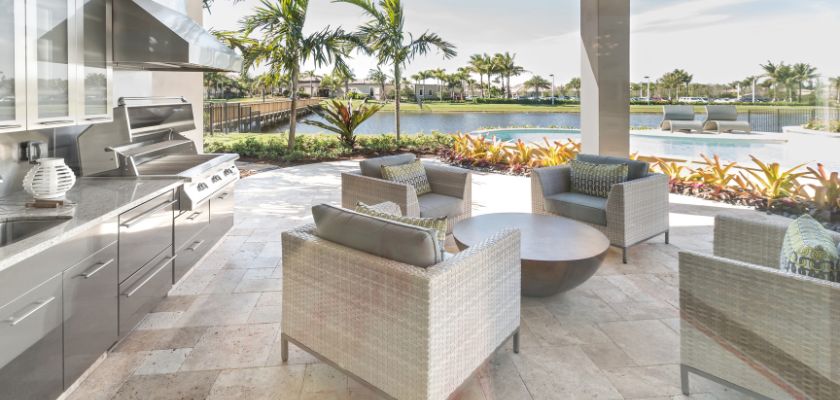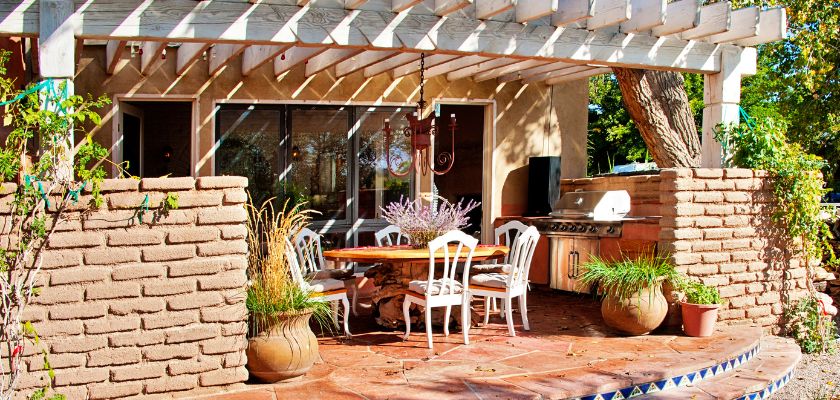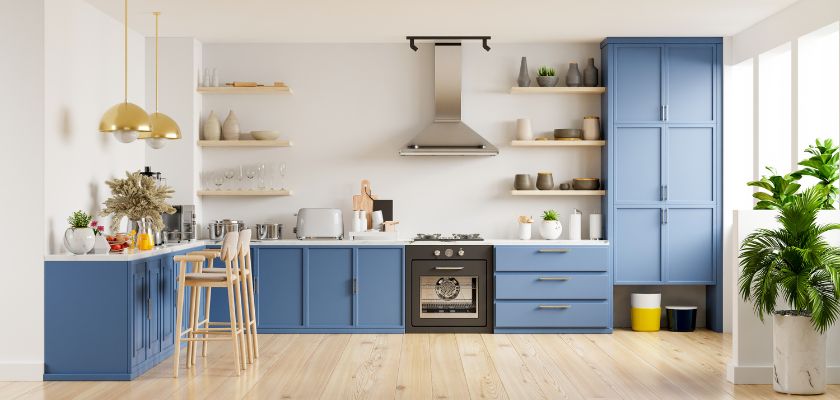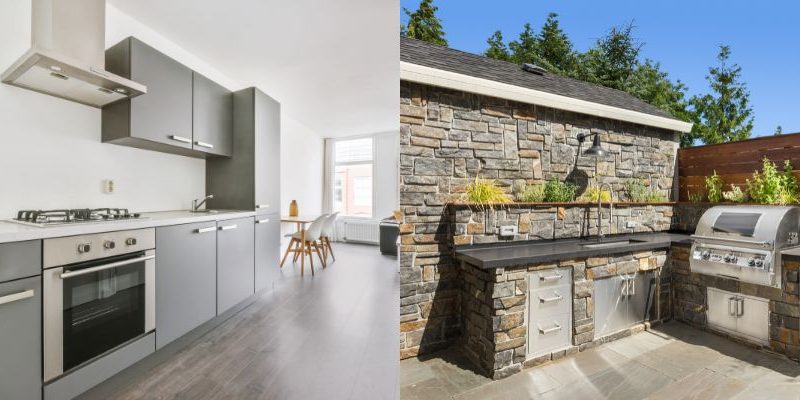A number of considerations must be made when choosing between an indoor and outdoor kitchen, including your preferred cooking style and the climate where you reside. Both stylish outdoor kitchens and incredibly practical indoor kitchens are our areas of expertise at Remodel Ntx. You can determine if updating your indoor kitchen or adding an outdoor kitchen bar is the better option for your house by weighing the benefits and drawbacks of each. We’ll go over the benefits and cons of each choice in this guide to help you make an informed choice.
Table Of Content
Benefits of Outdoor Kitchens

Enhanced Entertainment Space
Outdoor kitchens offer a unique entertainment experience, allowing guests to gather around the outdoor kitchen bar while meals are being prepared. This kind of setup promotes a social atmosphere that is less formal and more engaging than indoor settings.
Expanding Living Space
Building an outdoor kitchen effectively expands your living space. By moving the cooking outdoors, you open up your home, reduce indoor heat and smells from cooking, and integrate your living area with the outdoors, especially when equipped with a comfortable outdoor kitchen bar.
Increased Property Value
An outdoor kitchen can significantly increase your property value, providing a strong return on investment. Homes with outdoor kitchens are often seen as more luxurious and desirable, particularly in regions with warmer climates where outdoor living is feasible year-round.
Challenges of Outdoor Kitchens

Weather Dependence
The biggest drawback of outdoor kitchens is their dependence on weather conditions. Inclement weather can disrupt your cooking and dining experience unless your outdoor area is well-covered and weatherproofed with features like an outdoor kitchen bar that includes protective elements.
Higher Initial Setup Cost
Setting up an outdoor kitchen often involves higher initial costs. These can include extensive plumbing and electrical work, purchasing outdoor-specific appliances, and ensuring that all materials are weather-resistant and durable.
Maintenance Requirements
Outdoor kitchens require regular maintenance to keep them in good condition. This includes protecting appliances and surfaces from the elements and regular cleaning to handle exposure to dust, debris, and weather conditions.
Advantages of Indoor Kitchens

Year-Round Use
Unlike outdoor kitchens, indoor kitchens can be used comfortably year-round, regardless of weather conditions. This makes them highly practical and ensures that your cooking and dining experience is never interrupted by the climate.
More Appliance Options
Indoor kitchens can accommodate a wider range of appliances and do not require the weather-resistant specifications that outdoor kitchens do. This allows for more high-tech and specialty appliances that can enhance your cooking experience.
Lower Maintenance
Indoor kitchens typically require less maintenance compared to outdoor kitchens. They are protected from the elements, meaning less wear and tear on appliances and surfaces, and generally easier to keep clean.
Disadvantages of Indoor Kitchens
Space Limitations
Indoor kitchens are often limited by the space available within your home. Expanding an indoor kitchen can be costly and disruptive, unlike outdoor kitchens which can be more easily integrated into existing outdoor spaces.
Limited Social Interaction
Indoor kitchens may limit social interaction as guests often stay separate from the cooking area, especially in smaller spaces. This can make entertaining less interactive compared to gatherings around an outdoor kitchen Bar.
Heat and Odor Containment
Cooking indoors, especially during hot weather, can significantly increase indoor temperatures and trap odors. This might require more intensive ventilation solutions, adding to energy costs.
Final Wording
Choosing between an indoor kitchen and an outdoor kitchen depends largely on your lifestyle, climate, and entertainment needs. If you enjoy hosting large gatherings and live in a climate that supports outdoor living, an outdoor kitchen with a feature-rich outdoor kitchen bar may be an excellent investment. Conversely, if you prefer year-round usability without concern for weather, then an indoor kitchen might better suit your needs. At Remodel Ntx, we are dedicated to designing spaces that cater to the unique preferences and requirements of our clients, ensuring that every kitchen we remodel, whether indoor or outdoor, is not only functional but also a joy to use.
FAQ’s
Key considerations include your local climate, available space, budget, and lifestyle needs. If you frequently entertain and enjoy the outdoors, an outdoor kitchen might be ideal. However, if you live in a region with harsh weather or prefer the convenience of cooking indoors regardless of the season, an indoor kitchen may be more suitable.
An outdoor kitchen can function as the main cooking space in climates that are mild year-round. However, in most cases, it serves as an addition rather than a replacement, supplementing the primary indoor kitchen by providing an alternative space to cook and entertain during favorable weather.
Outdoor kitchens require more frequent maintenance due to exposure to weather elements such as sun, rain, and possibly snow. This includes covering and maintaining appliances and seasonal cleaning. Indoor kitchens, shielded from the elements, typically need less intensive maintenance focused mainly on regular cleaning and appliance care.
Generally, installing an outdoor kitchen can be more expensive initially due to the need for durable, weather-resistant materials and the potential extension of utilities (like water and electricity) to the outside. However, the cost can vary widely depending on the complexity and features of the kitchen. In contrast, renovating an indoor kitchen might focus more on aesthetics and appliances, potentially costing less if structural changes are not required.
Yes, outdoor kitchens typically require appliances that are specifically designed to withstand outdoor conditions. These include stainless steel grills, outdoor-rated refrigerators, and weather-resistant cooking stations. Indoor kitchens can utilize a broader range of appliances, including high-tech or specialized items that are not suitable for outdoor use due to their sensitivity to weather conditions.







